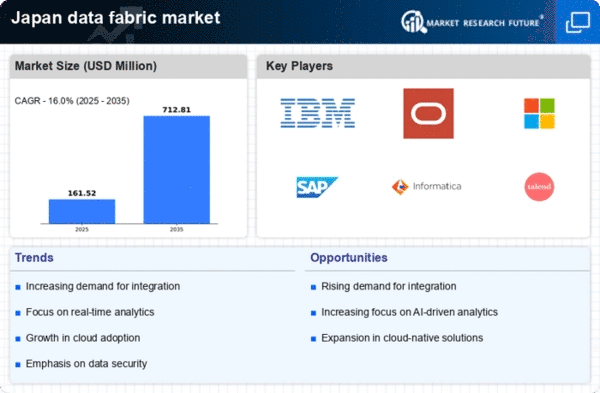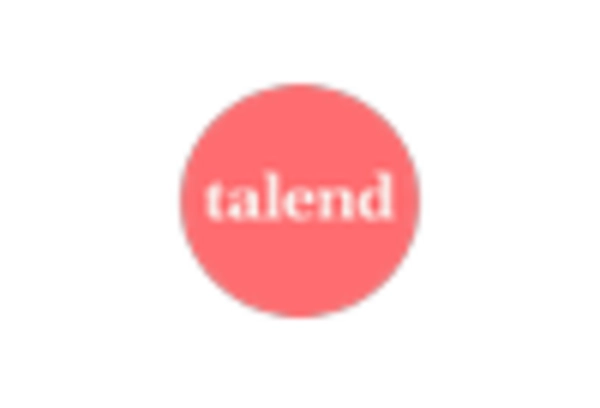Expansion of IoT Ecosystem
The proliferation of Internet of Things (IoT) devices in Japan is significantly influencing the data fabric market. With millions of connected devices generating vast amounts of data, organizations face the challenge of efficiently managing and analyzing this information. The data fabric market provides the necessary infrastructure to integrate and process data from diverse IoT sources, enabling businesses to derive actionable insights. Recent reports indicate that the number of IoT devices in Japan is expected to exceed 1 billion by 2026, creating an urgent need for robust data management solutions. As companies seek to harness the potential of IoT, the demand for data fabric technologies that can seamlessly connect and analyze data from various devices is likely to increase. This expansion of the IoT ecosystem is poised to be a key driver of growth in the data fabric market, fostering innovation and enhancing operational capabilities.
Increased Focus on Data Governance
In Japan, the data fabric market is witnessing a heightened emphasis on data governance as organizations strive to ensure data quality, compliance, and security. With the implementation of stringent regulations such as the Personal Information Protection Act (PIPA), businesses are compelled to adopt comprehensive data governance frameworks. This shift is driving the demand for data fabric solutions that facilitate data lineage, auditing, and access control. According to industry estimates, the data governance market is projected to grow by approximately 20% annually, reflecting the increasing recognition of the importance of data management practices. As organizations prioritize data governance, the data fabric market is likely to benefit from the integration of advanced governance features, enabling businesses to maintain compliance while maximizing the value of their data assets.
Growing Need for Data Integration Solutions
The data fabric market in Japan is experiencing a growing need for effective data integration solutions. As organizations operate in increasingly complex environments with multiple data sources, the ability to integrate and harmonize data becomes essential. Businesses are seeking data fabric technologies that can provide a unified view of their data landscape, enabling them to make informed decisions. Recent surveys indicate that over 70% of Japanese enterprises consider data integration a top priority for their digital transformation initiatives. This trend is likely to drive investments in data fabric solutions that offer seamless integration capabilities, allowing organizations to break down data silos and enhance collaboration across departments. The growing need for data integration solutions is expected to be a significant driver of growth in the data fabric market, as companies strive to leverage their data assets more effectively.
Rising Demand for Real-Time Data Processing
The data fabric market in Japan experiences a notable surge in demand for real-time data processing capabilities. As organizations increasingly rely on data-driven decision-making, the need for immediate access to data becomes paramount. This trend is particularly evident in sectors such as finance and retail, where timely insights can significantly impact operational efficiency and customer satisfaction. According to recent estimates, the market for real-time data processing solutions is projected to grow at a CAGR of approximately 25% over the next five years. Consequently, businesses are investing in data fabric technologies that facilitate seamless integration and management of data across various sources, thereby enhancing their ability to respond swiftly to market changes. This rising demand for real-time capabilities is likely to drive innovation and competition within the data fabric market, positioning it as a critical component of modern data architecture.
Emergence of Advanced Analytics Capabilities
The emergence of advanced analytics capabilities is reshaping the data fabric market in Japan. Organizations are increasingly recognizing the value of leveraging analytics to gain insights from their data. This trend is particularly pronounced in sectors such as healthcare and manufacturing, where data-driven insights can lead to improved outcomes and operational efficiencies. The data fabric market is responding to this demand by offering solutions that integrate advanced analytics tools, enabling businesses to perform predictive and prescriptive analytics. Recent studies suggest that the market for advanced analytics in Japan is expected to grow at a CAGR of around 30% over the next few years. As organizations seek to harness the power of analytics, the data fabric market is likely to see increased adoption of technologies that facilitate data exploration and visualization, ultimately driving innovation and competitive advantage.
















